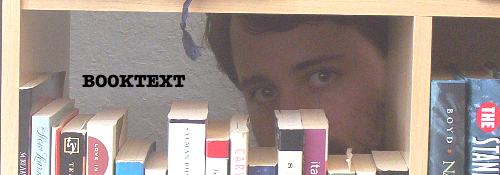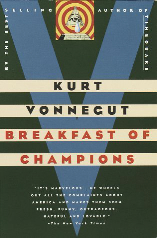Booktext, April 07--Breakfast of Champions

April 2007
Spotlight: Breakfast of Champions
Author: Kurt Vonnegut
Year: 1973
Length: 300 pages (appx., including illustrations by the author)
Publisher: Delacorte Press (currently Delta)
 Breakfast of Champions is Kurt Vonnegut's seventh full-length work of fiction, and it's (rightfully) among his most enduring. It's one of a handful of truly great works he's contributed to English literature, which should all be read and, more importantly, re-read. (The others, just so you know, are Slaughterhouse-Five, Cat's Cradle and his masterpiece Mother Night. Collect the whole set.)
Breakfast of Champions is Kurt Vonnegut's seventh full-length work of fiction, and it's (rightfully) among his most enduring. It's one of a handful of truly great works he's contributed to English literature, which should all be read and, more importantly, re-read. (The others, just so you know, are Slaughterhouse-Five, Cat's Cradle and his masterpiece Mother Night. Collect the whole set.)
Reading Vonnegut is truly a pleasure, and it's one that can't really be communicated. It's the pleasure of experience, rather than idea. He writes (with definite artful intention) with language that would be familiar to a third-grader. His themes are grand and his conclusions are universal but his writing is decidedly spare, simplistic. Small words, short sentences, quick chapters. Reading Vonnegut is like having the world summarized for you by an all-knowing yet soft-spoken child.
Breakfast of Champions might just encapsulate that wise child better than any of his other works. Basic ideas and commonplace events are explained to the reader almost as though he or she is from another planet and unfamiliar with, say, the concepts of flags, clothing, food, money or war. Vonnegut breaks each of these (and many other) "givens" down to their component parts and explains them from the ground back up, crafting not only a voice for the book, but a purpose. This book, like the one car salesman Dwayne Hoover will read late in the novel, is a book of awareness...a book that explains what we'd have never thought needed explaining. Dwayne Hoover uses his newfound awareness as an excuse to do very bad things to--for the most part--very good people. How will you use yours?
Have I not mentioned plot at all? Except for those last few sentences, there, no, I haven't. And that's because Breakfast of Champions treats its readers to more of a collection of anecdotes and explanations (and hilarious Kilgore Trout novel-summaries) than any kind of real plot. It's similar to what he attempted in God Bless You, Mr. Rosewater, except here...well, it works here. In Rosewater it was raggetty...distracting. In Breakfast of Champions it's more than effective; it's essential.
The action focusses on two main characters: Dwayne Hoover, who owns a Pontiac dealership in the American Midwest, and science-fiction writer Kilgore Trout, who owns absolutely nothing. Dwayne lives a quiet, introverted life in Midland City, and during the novel he drives himself gradually more insane by dwelling on the apparent meaninglessness of everything--as well as chronically suppressing memories of his wife's suicide and son's homosexuality. Kilgore spends his life installing aluminum storm windows and mailing off stories to pornographic magazines who never pay him or tell him if, where or when his work will appear.
The two characters are brought together for the Midland City Festival of the Arts, which Dwayne attends in the hopes that he will find meaning, and which Kilgore Trout attends so that he can noisily represent all of the artists that toil their lives away without ever finding money, fame, recognition or respect. After all, the other artists attending the festival are fabulously well-to-do. And Kilgore Trout has doodley-squat.
The dynamic between the fabulously well-to-do and those who have doodley-squat is a running theme in the book. As is the historical (and continuing) relations between blacks and whites in America. And power. That's another big one. So big, in fact, that the author himself climbs down into this book to demonstrate both its benefits and its limitations. It is Kurt Vonnegut who brings Dwayne and Kilgore together. It is Kurt Vonnegut who makes Kilgore write the book that will cause Dwayne to brutally harm many good people. And he's doing this, as an author, because, as a human being, he is afraid he's going to kill himself the way his mother did.
Wait.
What?
Breakfast of Champions is also autobiographical. Vonnegut pops up in the middle of scenes to explain who characters are based on, why he's making them behave in certain ways, and what it all means outside of the context of the book. It's a technique that could (and does) become very tiresome in the work of lesser authors. But here, it's positively haunting. Especially when delivered in the childlike voice of Kurt Vonnegut. It's moving, hilarious, unnerving stuff, and one senses that Breakfast of Champions is the result of a genuine psychological crisis on the part of the author, much like the one Dwayne faces in the book. But where Dwayne destroys, Vonnegut creates. (Of course, he's also creating Dwayne's destruction, which complicates the issue slightly.)
The book is loaded with illustrations, some of which are humorous, others passively disturbing...but all of them are drawn with the unsteady, simplistic hand of our author. Sometimes they make something more clear. Other times they fit in as part of a sentence. Sometimes it's just a handwritten line of dialogue. They're disorienting, but they're crucial, and they do a very important part in sustaining the voice of a child terrified by the life that stretches out ahead of him.
Breakfast of Champions might not be Vonnegut's best work overall, but he is writing at his best, and it's difficult to find another author who can write about horrifying things in such a pleasing, leisurely way. Reading Vonnegut is a delight, and it's only a matter of time before he's recognized as the definitive voice of America's quiet conscience.
![]()
Papercuts:
Life of Pi, Yann Martel (2001, 325 pages, appx.)
I've been haunted by this book for some time. It's one of those that you see on shelves constantly, but never actually hear anything about. You pick it up...yeah...it sounds interesting...but you always end up putting it back. Well, I took the plunge at last and bought it, and read all about young Pi's seafaring adventures with a Bengal tiger.
Yes, that's the book...a young Indian boy and a tiger enter into a sort of symbiotic relationship on the high-seas, encountering plenty of fish and sea-turtles along the way, and a blind castaway, and floating garbage, and a flesh-eating island. The story couldn't really decide between reality and fancy, but I think that was at least partially intentional.
And how was it? Well, I wouldn't turn anyone else away from reading it, but it seemed pretty limp on the whole. Interesting, but never very brave. Kudos for keeping the religion in the background rather than shoving it up my nose, as I was at times worried Martel was preparing to do. He did a good job of letting the reader decide for him or herself what to make of Pi's moral decisions, right up to rewriting the entire story at the end so that it involved humans instead of animals.
I probably won't be seeking out anything further from Martel, but neither is it an experience I regret.
![]()
Blindness, Jose Saramago (1995 Spanish, 1997 English translation, 325 pages, appx.)
A man and then a city and then a nation are struck by a case of "white blindness." There is no warning, and there is no cure. It seems to be communicable, but even that is unconfirmed. The newly-sightless are banked away in an abandoned mental hospital and left to fend for themselves without food, tools, order or hope.
And I have to say that this was just brutally good. An absolutely fantastic novel in every sense of the word, and easily one of the strongest recent works I've read in a long, long time. The "white blindness" epidemic remains unexplained throughout the book, but there's an obvious explanation for this lack of explanation, and, besides, 300 pages of theoretical science does not a good book make. Saramago sets the ball rolling in the very first sentence and it only gathers speed and power from there. This is killer stuff...strong and brave from beginning to end. It's one of those rare books I've just finished and already want to read again.
![]()
Raise High the Roof Beam, Carpenters, J.D. Salinger (1955, 100 pages, appx.)
I've read this a few times now...I'm inexplicably fond of it. More than a short story but not quite a novella, this is my favorite of Salinger's dips into the history of the family Glass. It's basically an extended scene excerpted from Seymour Glass' wedding day, only Seymour never puts in an appearance. It's told from the perspective of his brother Buddy, who ends up stuck in traffic with members of the bride's family. There is more to it than that, but not much.
Yet it's a very rewarding read. And second only to The Catcher in the Rye in Salinger's output. It's not the situation so much as how Salinger handles it. There's great fun to be had, but there's also a very clear unspoken tragedy behind it all. Buddy Glass is a fantastic narrator, balancing insight with pathetic boobery, and this story stands better on its own than any of the other Glass family installments.
The only problem is that you can only purchase this story bundled with another work: Seymour, an Introduction. Which is very interesting without ever being very good. The best and worst of Salinger in one convenient volume. But I didn't read Seymour, an Introduction this month so my final rating ignores it entirely. (As you should, too.)
![]()
About this entry
- By Phil Reed
- Posted on Sunday, April 01 2007 @ 5:42 pm
- Categorised in Books
- 0 comments
